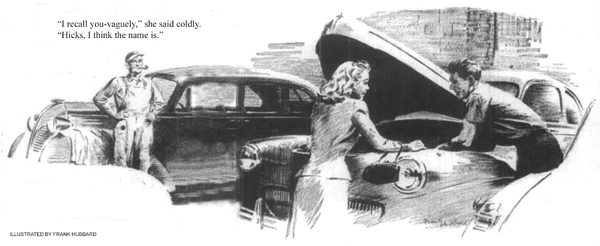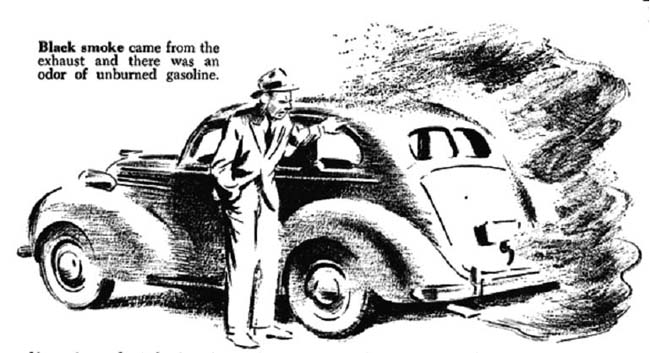November 1947
GUS SPOTS DOUBLE TROUBLE
by Martin Bunn
Anyone could see the fuel mixture was too rich - but why?
Cleaning and adjusting the carburetor made no difference.

Stan Hicks nudged his employer.
"Here's Old Man Trouble himself!" he said. Gus Wilson looked up. The driver was just getting out of an old but well-kept sedan he'd stopped in the center of the Model Garage shop floor. His thin face was creased with chronic dissatisfaction.
"Hello, Vern," Gus greeted him cheerfully. "Haven't seen you for a dog's age. Where've you been keeping yourself?"
Vernon Hopkins almost shouted. "There never was a time when a man got as little for his money as he does today. Look at my car. I've had it in three shops -- and there's still something wrong with it."
He had left the engine running. Gus noticed black smoke drifting out of the exhaust pipe, and his nose detected unburned gasoline. "I don't know what else is wrong with your bus," he said, "but your carburetor is certainly out of adjustment."
"Now, ain't you smart!" Vern's voice dripped mock admiration. "All three of those boneheads who worked on my car figured out there was something screwy about the carburetor -- but not one of them had any idea what the trouble is. And I'll bet you can't find out either."
"What'll you bet?" Gus challenged.
"Anything you want," Vern growled.
"Okay," Gus said. "Tonight's supper."
"Well -- all right" Vern agreed. "Now what are you waiting for? Find out what's wrong -- and fix it. I'm in a hurry."
"You're not our only customer -- thanks be!" Gus replied. "Three other jobs came in ahead of yours -- and will have to go out ahead of it. Come back at four o'clock. I'll have your bus ready."
"Four o'clock!" Vern howled. "What am I supposed to do until then -- walk?"
"It'll do you good," Gus said.
Vern stalked out.
Before Gus got to Vern's car it was nearly two o'clock. Then he took it out for a road test. After driving slowly for a few blocks he suddenly stepped hard on the accelerator. The engine choked and missed.
Keeping the accelerator pedal down, he threw out the clutch. Instead of speeding up, the engine continued to miss and sputter. "Carburetor out of whack, all right," he thought, as he turned back toward the Model Garage. Before he got there the engine was beginning to overheat. "Just what I thought -- too rich a mixture," he told himself.
He drove into the shop and sat for a few minutes listening to the engine's noticeably rough idling. Then he switched off the ignition, removed the carburetor, carried it over to his bench, and opened it.
It was one of those carburetor that have the float, hinge mechanism, and needle valve all mounted on the upper body, the latter in turn being mounted, over a gasket, on the bowl.
Disassembling the carburetor, Gus set to work to clean all the parts. As he did so, he checked each carefully, giving the float particularly close scrutiny, but found nothing either damaged or badly worn. So, after blowing out the passages and jets with compressed air, he reassembled the carburetor and put it back on the car.
Just as he finished, his partner Joe Clark called from the office door. "Hey, Gus! Mr. Morgan is here about that motor-rebuilding job. Come in, will you?"
Gus looked at the shop clock. It was almost three. He wanted to have Vern's car ready by four, and the chances were that Mr. Morgan would take a half hour.
"Stan," he said. "Take out this Hopkins job and road-test it. I've cleaned and checked the carburetor, and it should be all right -- but make sure."
Gus was back in the shop when Stan drove in, shaking his head. "Somethin' still wrong," he reported. "The engine doesn't run like it ought to, and it overheated."
He could add nothing to that report. Now thoroughly puzzled, Gus jumped into the car and drove out.
The engine acted just as it had before. He hurried back to the shop and quickly checked the ignition and fuel line, but there was a good hot spark at each plug and the gasoline flowed normally. "Must have missed something," he muttered, and again removed the carburetor, disassembled it, and began rechecking.
Half way through the job he was interrupted by a feminine voice that asked crisply; "Is my car ready?"
Gus looked up. The young woman's costume nicely set off an effectively streamlined chassis, and her pert face expressed determination to have what she wanted.
"Your car?" Gus asked. "Do we have it?"
"My father's," she snapped. "I'm Miss Hopkins."
Stan raised his head from the car on which he was working. "You don't mean you've grown up from that little Susie Hopkins who tried out for cheerleader in her freshman year-and didn't make it!"
The girl turned and leaned against the car. Smiling acidly, she looked Stan over with the expression of a scientist who has just discovered a new, but uninteresting, species of insect.
"Looking back at that horrible high school," she said coldly, "I seem to recall you -- vaguely. Hicks, I think the name is. You were on the football team, and it was your fumble that let Millbridge High beat us for the first time in 13 years."
Stan's ears got red. "The wind --
"The wind --" she mocked, making a derisive gesture with both hands. Then she turned back to Gus. "What I want to know is -- is my car ready?"
"Nope," Gus replied.
"But Dad said you'd promised to have it ready by four!"
Gus nodded toward the clock. "It's only twenty to four."
"I'll wait, then," she said, perching herself on the end of the bench. "What's the matter with the old wreck?"
"Carburetor," Gus said.
"Again?" she asked. "I haven't heard anything but 'carburetor' ever since Dad put that new gasket on it."
Gus looked thoughtful. "So your father did that job himself?" He examined the soft fiber gasket carefully. Then he placed it on the bowl and fitted the upper body of the carburetor over it, bringing the drop light closer so he could see better.
"There's nothing wrong with the gasket or its fit," he said after a moment. He lifted off the upper part of the body. "It's all -- "Gus abruptly stooped over and whistled softly. Then he removed the gasket and took the bowl to the window. After examining it carefully, he took a penknife from his pocket, scraped the top of the bowl, brought it back to the bench, quickly put the carburetor together, and reinstalled it on the car. Then he stepped on the starter. The engine ran smoothly.
It was one minute to four. "There's your car, Miss," Gus said. "Tell your father I had it ready on time."
"You can tell him yourself," Miss Hopkins said. "He'll be here soon. I was going to drive him home, but I'm overdue for tea at the Van Name's and can't wait."
As she got into the car, she turned to Stan. "You might drop in some evening. It would be quaint hearing about what happened at that old high school after I left."
Stan grinned. "Well," he said, "I've got Friday evening open."
She let in the clutch. "Call me first -- I might be busy."
Looking as grouchy as usual Vern Hopkins charged in a little later. "Where's my car?" he demanded.
"Your daughter took it," Gus said.
"What?" Vern howled. "Now I'll have to walk some more."
"That's what she said," Gus replied.
Vern's face softened. "Well," he said, "You have to let the kids have their way. By the way you didn't find out what's the matter, did you?"
"Yes, I found it -- and fixed it," Gus grinned. "You caused the trouble yourself when you put on that new gasket."
"Nonsense!" Vern snapped. "There's nothing wrong with that gasket."
"That's right," Gus said, "But when you put on the new one you didn't take off the old one. You didn't notice the old one because it was bonded to the carburetor bowl by pressure and heat and because it had become so discolored that it looked just like the bowl. I didn't spot it until I happened to shine a light on it."
"Well," Vern objected, "how could an extra gasket cause all that trouble?"
"On your carburetor," Gus explained, "both the float and the needle valve are mounted on the upper body -- lid to you.
"The extra gasket raised the float and valve seat, and so raised the gas level in the bowl -- just enough to make the fuel mixture too rich. That, of course, caused choking and missing and overheating of the engine. Now, how about that supper?"
END
L. Osbone 2019
